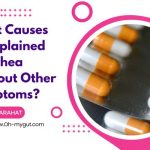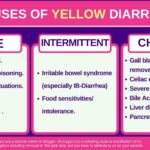Explosive Diarrhea After Eating: 9 Causes Explained.
Our content is not intended nor recommended as a substitute for medical advice by your doctor. Use for informational purposes only.
Possible causes of explosive diarrhea after eating include:
- Irritable bowel syndrome with predominant diarrhea.
- Exagerated gastrocolic reflex.
- Lactose intolerance and other types of food intolerance.
- Celiac disease.
- Bile acid diarrhea.
- Post-cholecystectomy diarrhea.
- Chronic pancreatitis and Exocrine Pancreatic Insufficiency.
- Psychological stress.
1- Irritable bowel syndrome.
Irritable bowel syndrome is a very common condition. IBS affects about 10-15% of the world’s population (ref).
IBS is a functional gut disease. “Functional” means that we (doctors) cannot find a specific lesion inside your GI tract.
IBS is recurrent abdominal pain (at least one day per week for the past three months). The onset of pain is associated with at least 2 of the following (ref):
- Defecation: the pain either resolves or increases with bowel movements.
- Change in stool form: with the onset of pain, the stool becomes harder or looser.
- Change in stool frequency: diarrhea or constipation.
Learn How doctors diagnose IBS HERE.
Doctors usually diagnose IBS based on the clinical criteria above. This is done after the exclusion of other diseases that have similar symptoms.
IBS has many subtypes. The important subtype that can cause recurrent explosive diarrhea after eating is diarrhea-predominant IBS.
Either food or stress triggers IBS with diarrhea. IBS diarrhea after eating is related to a famous group of food called FODMAPs (Fermentable Oligo-, Di-, Monosaccharides, And Polyols).
Common Examples of food that trigger Explosive diarrhea after eating with IBS:
- Wheat, barley, rye.
- Onion, garlic, and legumes.
- Lactose in ice cream, custard, yogurt, and other dairy products.
- Fructose is present in apples, pears, mangoes, and honey.
- Artificial sweeteners such as sorbitol, mannitol, and xylitol.
- Alcohol, caffeine.
- Beans.
The complete list of food that triggers IBS is here.
Consult your doctor if you have IBS (if you experience explosive diarrhea after eating for months).
2- Exaggerated gastrocolic reflex.
Another common cause of diarrhea after eating is an exaggerated gastrocolic reflex.
The normal gastrocolic reflex is a reflex increase in colon motility shortly after the food reaches your stomach.
Certain people may experience exaggeration of the reflex leading to explosive diarrhea after eating.
Exaggerated gastrocolic reflex may be due to:
- Psychological stress and anxiety.
- Eating large meals.
- Eating fatty foods.
- Drinking a large amount of cold liquid at once.
- Some theories attribute Irritable bowel syndrome to the exaggerated gastrocolic reflex.
From our experience, many people experience frequent bowel movements (and sometimes explosive diarrhea) after meals.
Most patients usually don’t match the irritable bowel syndrome criteria. And the cause is usually the exaggerated gastrocolic reflex.
But severe attacks of explosive diarrhea are not typical for the exaggerated gastrocolic reflex. Consult your doctor if you frequently experience explosive diarrhea after eating.
Learn more about gastrocolic reflexes.
Tips to reduce the exaggerated gastrocolic reflex:
- Limit the amounts of fat you eat. Try healthier types of fat instead of unhealthy fats.
- Eat smaller meals.
- Limit the usage of caffeine.
- Don’t drink many fluids at once (especially alcohol).
- Manage your stress.
3- Bile acid diarrhea.
Bile acid diarrhea (BAD) is a common and underdiagnosed condition. Bile acid diarrhea occurs when your intestine cannot handle bile acid properly.
This results in diarrhea with characteristic severe urgency and can present as explosive diarrhea after eating.
Interestingly, several studies stated that about 50% of patients with IBS with diarrhea (IBS-D) suffer from BAD. (ref1, ref2).
The symptoms of Bile acid diarrhea include:
- Diarrhea, which can be explosive after eating.
- Diarrhea can be chronic or occasional.
- Extreme and sudden urgency (explosive diarrhea).
- It may lead to soiling accidents.
- Related to fatty meals.
- Associated with bloating and abdominal pain.
The diagnosis of Bile acid diarrhea is usually difficult and overlooked by doctors because:
- Symptoms are very similar to IBS-D and chronic idiopathic diarrhea.
- The conventional tests such as stool analysis, colonoscopy, and abdominal CT test negative for BAD.
- The BAD-specific tests are not widely available.
Cholestyramine (Questran) is a bile acid sequestrant used to treat BAD. If you experience explosive diarrhea after eating with severe urgency, consult your doctor about the possibility of BAD.
Learn more about BAD and its relation to IBS.
4- Lactose intolerance.
Lactose is the sugar that is present in milk and other dairy products. Lactose intolerance is one of the most common types of food intolerance.
Surprisingly, Statistics reveal that up to 25% of the white population have some degree of lactose intolerance. (ref)
And more shockingly, the prevalence of lactose intolerance may reach up to 90% among other races, such as blacks, Native Americans, and Asian Americans. (ref)
Lactose intolerance is caused by:
- Primary lactose intolerance develops after childhood: due to lactase enzyme deficiency of unknown cause.
- Secondary lactose intolerance: due to intestinal mucosa damage, mostly after severe infections such as acute gastroenteritis, giardiasis, Ascaris, and others.
The symptoms are mainly diarrhea after eating dairy products such as milk, yogurt, ice cream, and other dairy products.
Diarrhea can be explosive, associated with abdominal pain and bloating.
Lactose intolerance symptoms are similar to that of IBS.
Consult your doctor if you think there is a relationship between explosive diarrhea and eating dairy products.
5- Other forms of food intolerance.
Lactose intolerance is the most widespread type of food intolerance. However, many other types of food intolerance exist.
Consumption of the offending foods will cause diarrhea after eating. Diarrhea may become explosive in severe cases or after consuming a large amount of the offending food.
Examples of food intolerances that can cause diarrhea after eating:
- Gluten sensitivity (celiac disease and non-celiac gluten sensitivity).
- Fructose intolerance (present in fruits and honey).
- Salicylate intolerance (occur naturally in many fruits, vegetables, and spices).
- Intolerance to food additives such as artificial colorings, artificial flavorings, and artificial sweeteners.
- Caffeine intolerance.
- Amines intolerance (produced by bacteria during food storage and fermentation).
Learn more about food intolerances.
6- Celiac disease.
Celiac disease is an extreme example of food intolerance. In celiac disease, your body is sensitive to a protein called gluten (in wheat, rye, and barley).
Eating gluten results in severe diarrhea (which can be explosive) and malabsorption.
People with celiac disease improve dramatically after cutting off the offending foods.
Symptoms of celiac disease:
- Chronic diarrhea.
- Bloating and gas.
- Nausea, loss of appetite.
- Weight loss.
- Anemia (can be severe if left untreated).
- Abdominal pain.
- In rare cases, it can cause constipation.
7- Stress.
Stressful situations or lifestyles or psychological problems such as anxiety can affect digestion.
Stress affects the muscles in the bowels or intestines. Also, research suggests that stress and anxiety can alter your gut microbiota (the beneficial bacteria inside your gut).
Chronic stress and anxiety can lead to explosive diarrhea after eating. Also, several studies link stress and irritable bowel syndrome with predominant diarrhea.
Consult your doctor if you think explosive diarrhea after eating is related to stress or anxiety.
More: instant diarrhea after drinking water: causes.
8- Chronic pancreatitis and EPI.
The pancreas secretes the majority of digestive enzymes. A healthy functioning pancreas is essential for proper digestion and gut motility.
Cases of chronic inflammation of the pancreas lead to damage of its tissues. The damage of pancreatic tissues will lead to a deficiency of digestive enzymes.
This condition is called Exocrine Pancreatic Insufficiency (EPI). The EPI is the result of chronic pancreatitis.
Symptoms of chronic pancreatitis and EPI:
- Diarrhea: oily or greasy diarrhea, can be explosive, especially after fatty meals.
- Pain in the upper abdomen can be referred to as the back.
- Weight loss.
- Nausea, vomiting.
- Loss of appetite (anorexia).
9- postcholecystectomy diarrhea.
Up to 20% of people undergoing cholecystectomy may suffer from diarrhea (ref).
Postcholecystectomy diarrhea is usually mild. But, it can be severe and explosive diarrhea (especially after eating fatty foods).
This type of diarrhea is usually self-limiting after a few months. However, some people suffer from diarrhea for years (ref).
Stomach cramps, gas, and bloating usually accompany the condition. Diarrhea can be explosive and yellow.
If explosive diarrhea started after the removal of your gallbladder, consult your doctor.
MORE: Feeling Sick (Fatigue) & Diarrhea after eating: 5 Main Causes Explained.
- Evidence-based
- Written by a doctor







